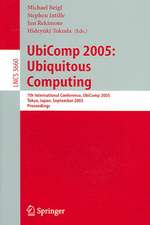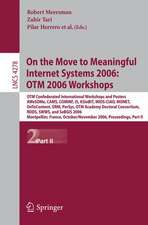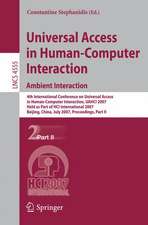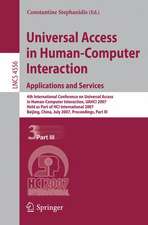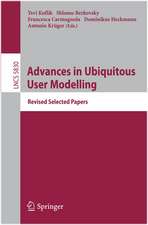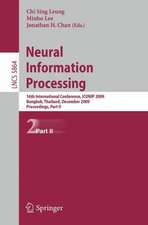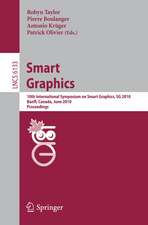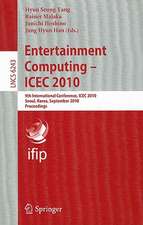Ways of Knowing in HCI
Editat de Judith S. Olson, Wendy A. Kelloggen Limba Engleză Paperback – 3 sep 2016
'It is an impressive collection in terms of the level of detail and variety.' (M. Sasikumar, ACM Computing Reviews #CR144066)
| Toate formatele și edițiile | Preț | Express |
|---|---|---|
| Paperback (1) | 597.94 lei 6-8 săpt. | |
| Springer – 3 sep 2016 | 597.94 lei 6-8 săpt. | |
| Hardback (1) | 604.39 lei 6-8 săpt. | |
| Springer – 20 apr 2014 | 604.39 lei 6-8 săpt. |
Preț: 597.94 lei
Preț vechi: 747.43 lei
-20% Nou
Puncte Express: 897
Preț estimativ în valută:
114.43€ • 119.03$ • 94.47£
114.43€ • 119.03$ • 94.47£
Carte tipărită la comandă
Livrare economică 14-28 aprilie
Preluare comenzi: 021 569.72.76
Specificații
ISBN-13: 9781493944057
ISBN-10: 1493944053
Pagini: 483
Ilustrații: XI, 472 p. 49 illus., 33 illus. in color.
Dimensiuni: 155 x 235 x 25 mm
Greutate: 0.68 kg
Ediția:Softcover reprint of the original 1st ed. 2014
Editura: Springer
Colecția Springer
Locul publicării:New York, NY, United States
ISBN-10: 1493944053
Pagini: 483
Ilustrații: XI, 472 p. 49 illus., 33 illus. in color.
Dimensiuni: 155 x 235 x 25 mm
Greutate: 0.68 kg
Ediția:Softcover reprint of the original 1st ed. 2014
Editura: Springer
Colecția Springer
Locul publicării:New York, NY, United States
Cuprins
Prologue.- Reading and Interpreting Ethnography.- Using Curiosity, Creativity, and Surprise as Analytic Tools: Grounded Theory Method as a Way of Knowing in HCI.- Knowing by Doing: Action Research as an Approach to HCI.- Concepts, Values, and Methods for Technical Human-Computer Interaction Research.- Study, Build, Repeat: Using Online Communities as a Research Platform.- Field Deployments: Knowing from Using in Context.- Science and Design.- The Rise of Research through Design in HCI.- Experimental Research in HCI.- Surveys in HCI.- Crowdsourcing in HCI Research.- Sensor Data Streams.- Eye-tracking: A Brief Introduction.- Understanding User Behavior through Log Data and Analysis.- Looking Back: Retrospective Study Methods for HCI.- Agent Based Modeling to Inform the Design of Multiuser Systems.- Social Network Analysis.- Research and Ethics in HCI.- Epilogue.
Recenzii
“It is a book about the different ways in which ‘knowing’ happens in HCI. … it is an impressive collection in terms of the level of detail and variety. … There are plenty of references in each chapter, which are good for those who want to dive deeper. … this is a welcome book for those with an interest in HCI. It will also be useful for any kind of research involving users and their experience.” (M. Sasikumar, Computing Reviews, December, 2015)
Textul de pe ultima copertă
This textbook brings together both new and traditional research methods in Human Computer Interaction (HCI). Research methods include interviews and observations, ethnography, grounded theory and analysis of digital traces of behavior. The background context, clear explanations, and sample exercises make this an ideal textbook for graduate students.
Chapters are consistently structured to describe the research methods and their applications, including what they are useful for, what they are not appropriate for, and the key ingredients needed before using a method. Each chapter provides:
· A short description of the method
· Its history and evolution
· The questions it can answer
· Guidelines to ensure quality work
· References for increasing expertise
· References to examples of successful application
· Exercises suitable for further student exploration
The chapters, written by foremost experts in the field, are highly diverse. They range from grounded theory and action research to retrospective analysis, agent-based modeling, and social network analysis. Several chapters focus on system building, such as technical research, building an experimental online community, and field deployments, while others focus on design research. Experiments and surveys are covered, including their potential to benefit from crowdsourcing. New sources of digital data sensory systems, eye tracking, and log analysis are discussed. Because many of these methods extend to the world of online activity, the book concludes by exploring the ethical challenges that have surfaced.
Ways of Knowing in HCI provides a starting point toward other avenues for continued learning. Readers will gain an understanding of the type of knowledge each method provides, its disciplinary roots, and how each contributes to understanding users, user behavior, and the context of use. The book is an invaluable resource for students, researchers and professionals alike.
Chapters are consistently structured to describe the research methods and their applications, including what they are useful for, what they are not appropriate for, and the key ingredients needed before using a method. Each chapter provides:
· A short description of the method
· Its history and evolution
· The questions it can answer
· Guidelines to ensure quality work
· References for increasing expertise
· References to examples of successful application
· Exercises suitable for further student exploration
The chapters, written by foremost experts in the field, are highly diverse. They range from grounded theory and action research to retrospective analysis, agent-based modeling, and social network analysis. Several chapters focus on system building, such as technical research, building an experimental online community, and field deployments, while others focus on design research. Experiments and surveys are covered, including their potential to benefit from crowdsourcing. New sources of digital data sensory systems, eye tracking, and log analysis are discussed. Because many of these methods extend to the world of online activity, the book concludes by exploring the ethical challenges that have surfaced.
Ways of Knowing in HCI provides a starting point toward other avenues for continued learning. Readers will gain an understanding of the type of knowledge each method provides, its disciplinary roots, and how each contributes to understanding users, user behavior, and the context of use. The book is an invaluable resource for students, researchers and professionals alike.
Caracteristici
Provides comprehensive and up-to-date coverage of current research methods in HCI Equips readers to handle complex research questions Includes a structured context with key references and thought-provoking exercises for students Includes supplementary material: sn.pub/extras





